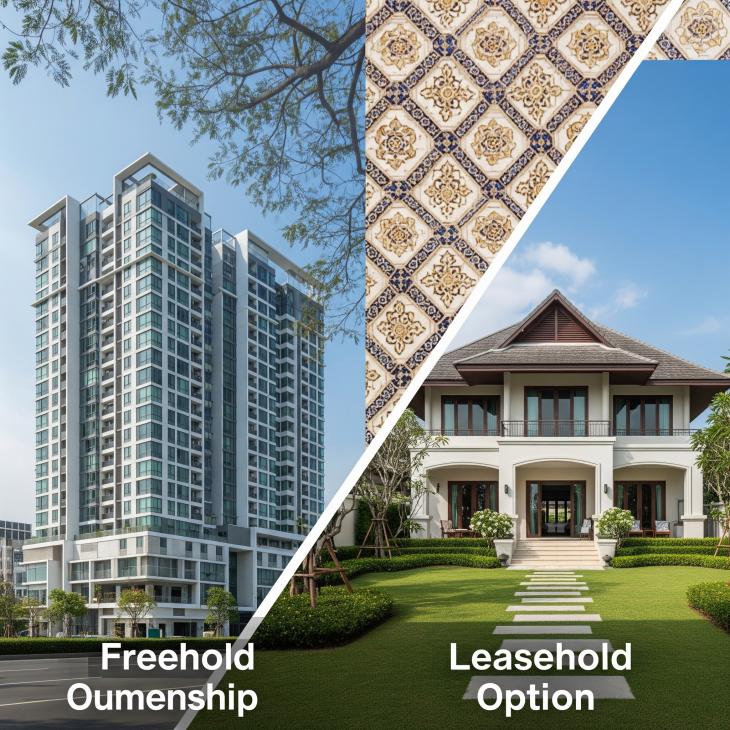Leasehold vs. Freehold Property in Thailand: A Guide for Expatriates
Navigating property ownership in a foreign country can be complex. For expatriates in Thailand, understanding the distinction between leasehold and freehold property is crucial before making any investment. This guide clarifies the rights and limitations associated with each structure under Thai property law.
What is Freehold Property in Thailand?
Freehold ownership is the most complete form of property ownership. In essence, it means you own the property outright, including the land (in some cases) and the structure built upon it. For foreigners, freehold ownership of land in Thailand is generally restricted. However, there are specific exceptions:
- Condominiums: Foreigners can own condominium units freehold, provided that no more than 49% of the total unit space in a condominium building is foreign-owned. The funds used for purchase must also be remitted from overseas.
- Limited exceptions for land: In very specific and rare circumstances, such as through significant investment approved by the Board of Investment (BOI), foreigners might be able to own a limited amount of land for residential purposes. These are not common avenues for the average expatriate.
Rights of Freehold Owners (primarily for condominiums):
- Full ownership rights of the unit.
- Right to sell, lease, mortgage, or bequeath the property.
- Name registered on the title deed (Chanote for condominiums).
- Generally considered a more secure long-term investment.
Limitations of Freehold Ownership for Expats:
- Strictly limited to condominiums for most foreigners regarding direct ownership.
- The 49% foreign ownership quota in a condominium project can limit availability.
- Owning land directly as an individual foreigner is highly restricted.
What is Leasehold Property in Thailand?
Leasehold is a common way for foreigners to secure rights to use land and property in Thailand, including houses and villas. With a leasehold, you do not own the property itself, but rather you acquire the right to use the property for a specified period. Key aspects of leasehold include:
- Lease Term: Under Thai law, a lease agreement for immovable property can be registered for a maximum term of 30 years.
- Renewals: While lease agreements often include clauses for renewal (e.g., an additional 30 years, or even 30+30+30 years), these renewal options are contractual promises by the lessor and not an automatic legal right to extension beyond the initial 30-year registered term. The enforceability of multiple pre-agreed renewals can be complex.
- Registration: Leases for a term longer than three years must be registered with the relevant Land Department to be legally enforceable for the full term against third parties.
Rights of Leasehold Tenants:
- Right to possess and use the property for the agreed lease term.
- Depending on the lease agreement, the right to sublet or transfer the lease (often subject to the lessor's consent).
- Right to own any buildings or structures constructed on the leased land, if specified in the agreement (this can be structured as a superficies).
Limitations of Leasehold Ownership for Expats:
- No outright ownership: The property ultimately still belongs to the Thai lessor.
- Limited term: The maximum initial registered lease is 30 years. Renewals depend on the lessor and the terms of the agreement, introducing an element of uncertainty for very long-term planning.
- Inheritance: Leasehold rights are personal contractual rights and may not automatically transfer to heirs upon the lessee's death unless specifically structured within the lease agreement (e.g., through a succession clause, though enforceability can vary). This is a critical point to discuss with a legal advisor.
- Resale value: The remaining lease term can affect the resale value of the leasehold rights.
- Financing: Obtaining a mortgage on a leasehold property can be more challenging than for a freehold property.
Making the Right Choice for You
The decision between leasehold and freehold depends on your individual circumstances, long-term plans, and risk tolerance.
- Freehold condominiums offer the security of outright ownership and are often preferred for long-term investment and personal use if one is comfortable with apartment-style living.
- Leasehold properties (often houses or villas) can provide access to larger properties or specific locations where freehold land ownership by foreigners is not permitted. It's crucial to conduct thorough due diligence on the lessor and the lease agreement.
Given the complexities of Thai property law, especially concerning foreign ownership, seeking professional legal advice from a qualified lawyer in Thailand is essential before entering into any property transaction. A lawyer can help you understand the specific terms of your agreement, conduct due diligence, and ensure your rights are protected.
Frequently Asked Questions (FAQ)
Q1: Can a foreigner buy land in Thailand?
A1: Generally, no. Thai law prohibits foreigners from directly owning land in their name. There are very limited exceptions, such as through substantial investment under Board of Investment schemes, but these are not common for typical residential purchases. Leasehold is the most common way for foreigners to have long-term use of land.
Q2: How long can a foreigner lease property in Thailand?
A2: The maximum registered lease term is 30 years. While lease agreements may contain clauses for renewal (e.g., 30+30 years), these are contractual promises and not automatic legal extensions. Each renewal typically requires a new registration.
Q3: Is my leasehold inheritable in Thailand?
A3: Not automatically. Standard lease agreements often terminate upon the death of the lessee. However, lease agreements can be structured to include succession clauses or transfer rights to heirs, but the enforceability and specifics need careful legal review and drafting. It's not as straightforward as inheriting freehold property.
Q4: What happens when a 30-year lease expires in Thailand?
A4: If there are no legally sound and enforceable renewal clauses, or if the lessor chooses not to renew, the right to use the property reverts to the lessor (the owner of the land/property). Any buildings on the land may also revert to the landowner, depending on the original agreement (e.g., if a superficies agreement is not in place or expires).
Q5: Can I get a mortgage for a leasehold property in Thailand as a foreigner?
A5: It can be more difficult for foreigners to obtain mortgages from Thai banks for leasehold properties compared to freehold condominiums. Some international banks or specialized lenders might offer financing, but terms and availability vary.
Q6: What is the 49% rule for condominiums?
A6: This rule stipulates that in any condominium building, a maximum of 49% of the total saleable area can be owned freehold by foreigners. The remaining 51% must be owned by Thai nationals or Thai entities.
External Links for Further Information:
- Thailand Board of Investment (BOI) - For information on investment incentives which may include property ownership aspects for significant investments.
- Thailand Department of Lands - The primary government agency responsible for land registration and administration (website primarily in Thai, but some English information may be available).

